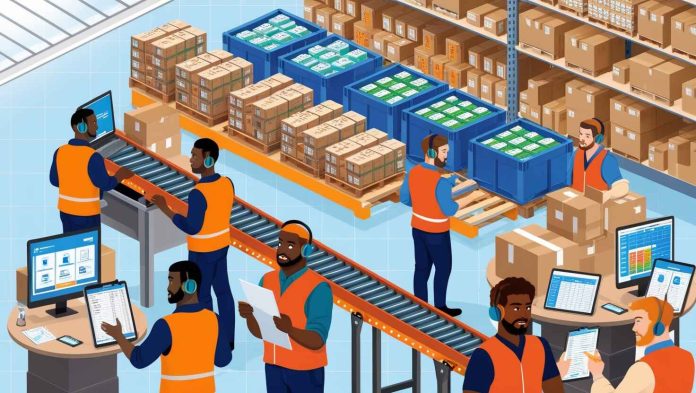In today’s fast-paced digital world, ecommerce has evolved into a cornerstone of global business. With an ever-growing number of online stores, it’s critical to master various facets of e-commerce to stay competitive. Whether you’re a small business owner or a seasoned enterprise, understanding essential components like order fulfillment, funding, AI integration, and logistics will help you scale your business and meet customer expectations…
🟢The Best Hosting to Create Website
E-commerce Order Fulfillment: A Backbone of Success

Order fulfillment is the process of getting a product from your e-commerce warehouse to the customer’s doorstep. A well-optimized e-commerce fulfillment center ensures that orders are processed quickly and efficiently, contributing to higher customer satisfaction.
In modern ecommerce, fulfillment strategies vary based on business needs. For example, small businesses often manage their e-commerce fulfillment internally to reduce costs, while larger organizations outsource to third-party logistics (3PL) providers. Using tools such as Magento ecommerce or VTEX ecommerce, sellers can automate their order fulfillment processes, ensuring that every step— from order confirmation to delivery—flows smoothly.
Ecommerce Funding: Securing Growth and Expansion
Whether you’re a startup or an established brand, securing adequate funding is essential for scaling. E-commerce lending and e-commerce loans provide business owners with the capital necessary to expand inventory, improve logistics, or invest in technology.
Various financial institutions and online platforms offer specialized e-commerce funding solutions designed for online businesses. Options include traditional bank loans, peer-to-peer lending, and venture capital funding. Proper funding allows businesses to expand their operations, open new e-commerce warehouses, or hire an e-commerce graphic designer to revamp their online presence.
The Role of AI in E-commerce
Artificial intelligence (AI in e-commerce) is transforming the way businesses operate. From personalized recommendations to AI-powered e-commerce analytics, companies are leveraging technology to enhance the customer experience and streamline operations.
AI in e-commerce customer service can handle common queries via chatbots, improving response times and freeing up human staff for more complex tasks. Ecommerce AI is also revolutionizing e-commerce returns management, offering predictive analytics that reduce return rates and optimize stock levels.
E-commerce Logistics: A Critical Component of Operations
Efficient logistics are vital for the success of any e-commerce venture. With proper e-commerce logistics management, businesses can minimize shipping delays, manage inventory better, and ensure that customers receive their orders on time. This can involve managing e-commerce fulfillment centers, maintaining accurate stock counts, and streamlining the delivery process.
Outsourcing logistics to experienced companies can significantly improve efficiency. For smaller businesses, working with an e-commerce virtual assistant or hiring e-commerce listers to manage product listings can free up valuable time to focus on strategy and growth.
Ecommerce Platforms: Choosing the Right Solution
Selecting the right e-commerce platform is one of the most important decisions you’ll make for your online business. Magento ecommerce is one of the leading platforms for flexibility, scalability, and customization. It is highly recommended for medium to large-scale businesses looking to manage complex e-commerce environments.
On the other hand, VTEX e-commerce offers cloud-based solutions designed for fast-growing companies that need flexibility and integrated omnichannel capabilities. The platform allows seamless integration with e-commerce accounting software such as Netsuite e-commerce, providing comprehensive solutions for inventory and sales management.
E-commerce for Small Business: How to Stay Competitive
Small businesses have to compete with giants in the ecommerce industry. This is where focusing on ecommerce analytics, ecommerce email marketing, and customer retention strategies can make a difference.
One important aspect is setting up a solid ecommerce training program for staff to stay on top of industry trends. Additionally, outsourcing tasks like design to a skilled ecommerce graphic designer or customer support to an ecommerce virtual assistant can free up internal resources…
🟢The Best e-commerce platform
Why Ecommerce Is Growing
The surge in ecommerce popularity can be attributed to several factors, including the convenience it offers to consumers and the ever-expanding capabilities of digital platforms. Additionally, the integration of AI in ecommerce and improved logistics has made online shopping more accessible, trustworthy, and efficient.
More consumers prefer the ease of online shopping, while businesses are increasingly drawn to the lower overhead costs and the ability to scale operations quickly.
Optimizing Ecommerce Returns
Returns are inevitable in ecommerce, but managing them efficiently is key to minimizing losses. Streamlining the ecommerce returns process through AI-based solutions, detailed product descriptions, and customer reviews can help reduce return rates. Automated systems can track returns, providing insights that improve both the product offering and the customer experience.
The Future of Ecommerce: Embracing AI and Analytics
As AI becomes more integrated with ecommerce platforms, its role in optimizing various business processes—from ecommerce analytics to automated marketing campaigns—will continue to grow. AI-driven tools allow for more personalized customer experiences, resulting in increased engagement and sales.
Ecommerce analytics tools provide in-depth insights into customer behavior, helping businesses fine-tune their marketing strategies. Additionally, data gathered through these tools enables smarter inventory management, making e-commerce logistics and fulfillment more efficient.
Incorporating AI also opens doors to advanced e-commerce training modules that can educate teams on how to harness the power of data and automation to drive growth. This continuous learning ensures that ecommerce businesses remain agile and responsive in a rapidly evolving landscape.
Conclusion
Mastering the complexities of ecommerce order fulfillment, funding, logistics, and AI integration is essential for businesses seeking growth in a highly competitive landscape. Whether you’re leveraging platforms like Magento ecommerce or using AI to streamline processes, the key to success lies in understanding and optimizing every part of your ecommerce operation…


